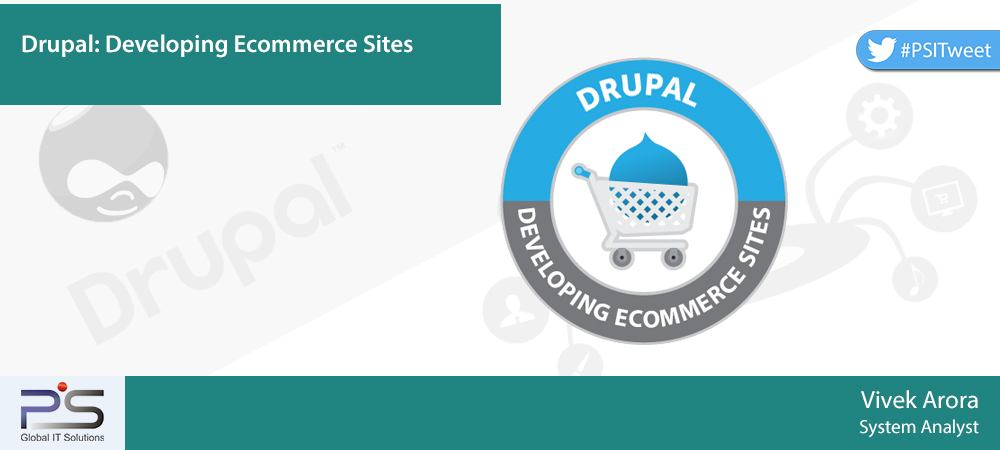
71% of shoppers believe they will get a better deal online than in stores; a statistic to motivate an entrepreneur in the mind of enthusiastic readers. The first question that arises is how to create an ecommerce site? The technology stack required and other particulars confuse the person. Here Drupal comes to your rescue.
Drupal is one of the most powerful, flexible platforms with the capabilities of both content management and e-commerce. To start a Drupal based e-commerce site, you just need to install Ubercart or Drupal Commerce, two of the best open source extensions available for a shopping site. For marketing activity you can use core or contributed modules to create a blog, a forum, a community or events. Using Drupal for building your ecommerce website has several advantages.
The major benefit Drupal provides is being an open source CMS. So every feature of content management can be performed seamlessly with Drupal. With the core Drupal entity in conjunction with Views module, any content can be created. You can embed fields in it (image, text, video, link, without any limitation). Any content can be displayed on your site. Ready to use modules are available for almost all the popular payment gateways for both integrated checkouts and hosted checkouts. Drupal makes it easier time working with content & the shopping cart without additional efforts to handle the SEO plans, website analytics in two different systems in contrast to other platforms. Last but not the least; Drupal is rated very high in terms of being a secure platform.
The features provided by Ubercart/Drupal Commerce can effectively cater to all the e-commerce requirements for small & medium online businesses.
Let me now elaborate the process for developing an e-commerce website using Drupal.
Organize the required description
Plan for the basic business approach, user interface, brands and products for listing/selling, the product description, availability of combo offers, connectivity among the wholesalers & the suppliers, referral and reward programs, the social media & community related aspects of the website. The features w.r.t. special sale offers, fellow customer reviews and purchases etc, can be rolled out using Drupal.
Plan the Design template
The design and display of the website homepage, the category landing page, and the individual product detail page and the flow of the website are the key factors. The Drupal modules can customise the functionality of the website according to the requirements.
Website Configuration
This requires a thorough plan for the website variables; be it website name, contact numbers & help desk details etc, the catalogue or categorisation of the products, pricing and payment modules, product attributes, inventory details and the shipping information.
Product Model and Prototype
The quality images of the products offered from different angles, the product combination with other suitable peripherals. Drupal along with Ubercart offers easy installations for a shopping cart. Depending on the type of shopping site and features required, additional modules can be implemented.
Product Attributes Configuration
To enable the support for defining the product attributes you can use Ubercart Attribute and Ubercart Products as Attribute Options, these modules allow site administrators to define different rates for the same product on the basis of attributes like size, colour etc… and also helps to manage the stocks by different attributes.
Payment Module
Ready to use modules are available for almost all the popular payment gateways for both integrated checkouts (Customer complete checkout end-to-end on your site.) and Hosted checkouts (Customers are redirected to the payment system provider’s website to complete payment.) for instance Ubercart / Drupal commerce have plug-n-play modules available for paypal, Converge (VirtualMerchant), Authorize.net, Ingenico Payment Services, 2checkout, Moneris, USA ePay etc…
Shipping Module
Ubercart Shipping quote module provides custom shipping quotes based on configurable weight ranges and custom shipping zones, this module can use the FedEx Web Services API to get rate quotes directly from the FedEx server and can generate barcode shipping labels, valid for FedEx shipping.
Drupal helps systematize an e-commerce website without chaos and with built in security aspects.71% of shoppers believe they will get a better deal online than in stores; a statistic to motivate an entrepreneur in the mind of enthusiastic readers. The first question that arises is how to create an ecommerce site? The technology stack required and other particulars confuse the person. Here Drupal comes to your rescue.
Drupal is one of the most powerful, flexible platforms with the capabilities of both content management and e-commerce. To start a Drupal based e-commerce site, you just need to install Ubercart or Drupal Commerce, two of the best open source extensions available for a shopping site. For marketing activity you can use core or contributed modules to create a blog, a forum, a community or events. Using Drupal for building your ecommerce website has several advantages.
The major benefit Drupal provides is being an open source CMS. So every feature of content management can be performed seamlessly with Drupal. With the core Drupal entity in conjunction with Views module, any content can be created. You can embed fields in it (image, text, video, link, without any limitation). Any content can be displayed on your site. Ready to use modules are available for almost all the popular payment gateways for both integrated checkouts and hosted checkouts. Drupal makes it easier time working with content & the shopping cart without additional efforts to handle the SEO plans, website analytics in two different systems in contrast to other platforms. Last but not the least; Drupal is rated very high in terms of being a secure platform.
The features provided by Ubercart/Drupal Commerce can effectively cater to all the e-commerce requirements for small & medium online businesses.
Let me now elaborate the process for developing an e-commerce website using Drupal.
Organize the required description
Plan for the basic business approach, user interface, brands and products for listing/selling, the product description, availability of combo offers, connectivity among the wholesalers & the suppliers, referral and reward programs, the social media & community related aspects of the website. The features w.r.t. special sale offers, fellow customer reviews and purchases etc, can be rolled out using Drupal.
Plan the Design template
The design and display of the website homepage, the category landing page, and the individual product detail page and the flow of the website are the key factors. The Drupal modules can customise the functionality of the website according to the requirements.
Website Configuration
This requires a thorough plan for the website variables; be it website name, contact numbers & help desk details etc, the catalogue or categorisation of the products, pricing and payment modules, product attributes, inventory details and the shipping information.
Product Model and Prototype
The quality images of the products offered from different angles, the product combination with other suitable peripherals. Drupal along with Ubercart offers easy installations for a shopping cart. Depending on the type of shopping site and features required, additional modules can be implemented.
Product Attributes Configuration
To enable the support for defining the product attributes you can use Ubercart Attribute and Ubercart Products as Attribute Options, these modules allow site administrators to define different rates for the same product on the basis of attributes like size, colour etc… and also helps to manage the stocks by different attributes.
Payment Module
Ready to use modules are available for almost all the popular payment gateways for both integrated checkouts (Customer complete checkout end-to-end on your site.) and Hosted checkouts (Customers are redirected to the payment system provider’s website to complete payment.) for instance Ubercart / Drupal commerce have plug-n-play modules available for paypal, Converge (VirtualMerchant), Authorize.net, Ingenico Payment Services, 2checkout, Moneris, USA ePay etc…
Shipping Module
Ubercart Shipping quote module provides custom shipping quotes based on configurable weight ranges and custom shipping zones, this module can use the FedEx Web Services API to get rate quotes directly from the FedEx server and can generate barcode shipping labels, valid for FedEx shipping.
Drupal helps systematize an e-commerce website without chaos and with built in security aspects.[:]








